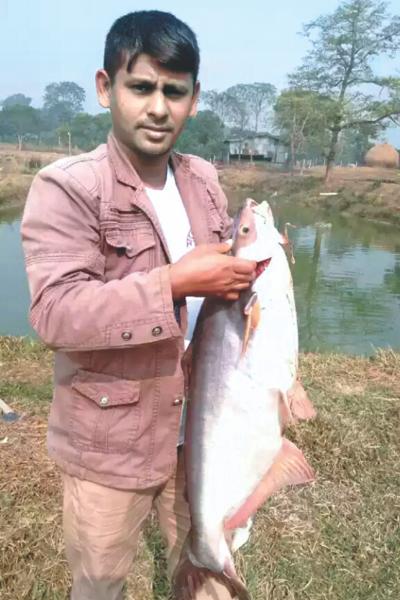Bhaluka's pangas farmers struggling to stay afloat

Babul Munshi has been commercially cultivating some local fish species, mostly pangas, in Bhaluka of Mymensingh for the past 11 years taking a Tk 2 crore bank loan and paying yearly instalments.
It was all smooth sailing until some three years back when wholesale fish prices started to fall while feed became costlier.
The losses have mounted to such an extent that Babul is getting buried in even more loans to pay the instalments.
He is not alone.
Another farmer, Mainul Huda, said he has been facing “serious losses” for the past two years.
He said he incurred a loss of Tk 1 crore and had already started borrowing money and selling off property to pay bank instalments for a Tk 3 crore loan he took last year.
He also blamed the increase in the number of fish farmers for the trouble.
One farmer said his annual sales of pangas dropped from 4-5 lakh pieces to just 1-2 lakh pieces in just two years.
The predicament has put into danger the livelihood of most of around 6,000 farmers of Bhaluka, which caters to some 70 percent of the country's demand for pangas, according to the upazila's Senior Fisheries Officer Rumana Sharmin.
Many have already gone bankrupt and abandoned their endeavours.
Sharmin too blamed a rise in fish feed prices and drop in wholesale fish prices.
Babul said they spent Tk 70-90 behind each pangas, as each one requires two kilogrammes of feed to reach one kg in weight and become ready to be sold in the market.
The selling price had been more than Tk 100 until last December when it dropped to Tk 50-60, he said.
He said there has been a slight price rise for the past one month but recouping losses seemed a far cry.
Mainul said the cost of making one kg of feed at home rose from Tk 27 to Tk 35 while the price of manufactured feed available in the market increased from Tk 35 to Tk 45.
He said wholesalers from other districts including Cumilla, Chattogram, Sylhet, Barishal, and Brahmanbaria were no longer solely dependent on the upazila's produce.
Abu Bakar Siddiqui, also a farmer, said other local species were also experiencing a price drop in the wholesale market.
“We have already informed the higher-ups and steps are being taken to provide subsidies,” said Sharmin.
Zillur Rahman, deputy director for aquaculture at the fisheries department, said they were giving emphasis on homemade feed and reducing management costs like electricity bills.
“Subsidy is not a permanent solution. We are trying to encourage people to go for exports,” he said, adding that this would help increase demand alongside prices.
